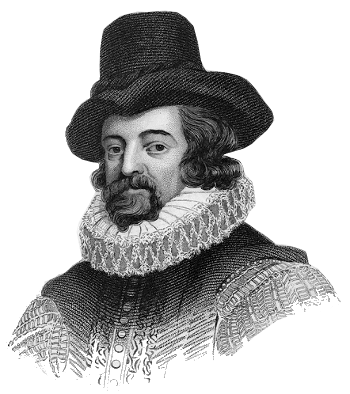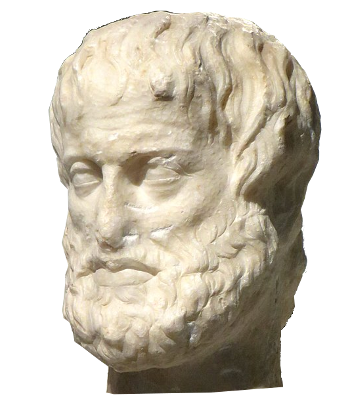400 Years of the Novum Organum
July 6, 2020
I took a
course in
rhetoric as a
freshman undergraduate. It's unlikely that you'll find such a course listed in many
college catalogs, but rhetoric,
historically, has been an important subject. While rhetoric is usually understood as merely the
art of persuasion, it also encompasses the use of
logic and proper
grammar in making your
argument. Two important principles that I learned from this rhetoric course were to express
ideas in the least number of
words, and to express those ideas in a manner that's
unambiguous.
We're all trapped by the
languages that we use; and, sometimes, it becomes difficult to convey the proper meaning of things. This is important in writing
scientific papers, which still contain a lot a
text along with their
graphs and
equations. The idea that language can be confusing when trying to express scientific ideas was noted by
Francis Bacon (1561-1626) in his influential
Latin treatise,
Novum Organum.[1-4] The Novum Organum is celebrated this year on its 400th
anniversary.[5]

Francis Bacon (1561-1626).
Bacon was Lord High Chancellor of England, but he was convicted of taking bribes and spent a few days in the Tower of London. The King was merciful, remitting a very hefty fine for this crime, but Bacon was barred from holding future office or sitting in parliament.
Among his notable works is his New Atlantis, an incomplete utopian novel, published posthumously in 1626, in which he presented a vision of a future built on science and discovery and the idea of the research university.
(engraving from Bacon's 1597, Meditationes Sacrae, a collection of religious meditations. Wikimedia Commons image by Grecmaxim18.)
Bacon, who was a contemporary of
Galileo (1564-1642), derived the name of this book from the
Organon of
Aristotle (384-322 BC), a work about logic and
logical syllogism. Bacon's Novum ("New") Organum was a supposed improvement of Aristotle's method through the use of
inductive reasoning as aided by careful observations of the
natural world. The book also contained a list of human weaknesses that work against inductive
integrity.
Bacon identified five problems in our quest for
knowledge in his Novum Organum. He labeled the aforementioned problem caused by the imprecise nature of language as an
Idol of the Marketplace (Idola fori). Calling such a thing an idol sounds strange, today, but it must have made sense
400 years ago. The other
idols are as follow:
Idols of the Tribe (Idola tribus) - This describes the tendency that humans have to perceive systems as more ordered than they really are.
Idols of the Cave (Idola specus)- Defects in reasoning arising from a person's personality, such as being of an optimistic or pessimistic nature. I think we've seen examples of this in the response to the coronavirus pandemic.
Idols of the Theater (Idola theatri) - This is formally known as the logical fallacy of argumentum ad auctoritatem. This essentially means not questioning authority; for example, Medieval scholars not questioning Aristotle. Bacon argues that observations (as obtained, today, through experiment) are better than conjecture,
Bacon made special mention of Aristotle in the section of Novum Organum entitled, "Aphorisns." In Book I, LIV, he writes,
Aristotele... naturalem suam philosophiam logicae suae prorsus mancipavit, ut eam fere inutilem et contentiosam reddiderit.
Aristotle... made his natural philosophy completely subservient to his logic, and thus rendered it little more than useless and disputatious.
(Latin text from
WikiSource.[4]
English translation from
Project Gutenberg.[1])
So, what lessons does Bacon's Novem Organum have for today's
scientists? In our age of established
scientific journals publishing refereed papers on critical experiments, I wouldn't pay much attention to Bacon's
idola theatri. There's the "
standing on the shoulders of giants"
principle by which a particular paper is the product of many things that came before it. It appears that the
armchair theorist authors of the many "
Einstein was Wrong" type of paper take this idol too seriously by rejecting all the evidence at hand.
As for the other idols, I've often tried to identify patterns in my all too imperfect data, thus acting as a
worshiper at the
altar of the idola tribus. The idola specus includes a scientist's defense of his own
theory in disregard of contrary evidence.
Society abounds with many examples of this idol in addition to the response to the coronavirus pandemic. While "
flat Earthers" have essentially gone
extinct, the idola specus lives on in
climate change denial, the people who believe that the
Moon landing was faked, and resistance to
environmental protection.
Also placed at the altar of the
idola fori is the use of cerain
key words in publications to gain exposure to
funding sources.[5] Everything is
nano-,
robotic, or
artificially intelligent, today. My prior field of
magnetic bubbles may have existed several years longer than it should have after the onslaught of better
semiconductor memory since it had a catchy name.
The Novum Organum includes Bacon's idea of how science should be done, his
Baconian method. The Baconian method, which many say is the first formulation of a modern
scientific method, is a simple process of
reduction and inductive reasoning. This method involves placing all situations in which a
phenomenon is found in three categorized lists.
The first list contains all of the situations in which the phenomenon is found. The second list contains situations that are similar to those of the first list, except for the fact that the phenomenon does not occur. The third list has observations in which the measure of the phenomenon varies. The true cause of the phenomenon, what Bacon calls the
form nature is common to every item on the first list, it's missing from all items on the second list, and it varies by degree over the items on the third list. This process is somewhat simplistic, and it does not consider experimentation, but it resonated with the
17th century audience of the Novum Organum.

Lest we heap too much scorn on Aristotle, he did create syllogistic logic, a formal logic that persisted into the 19th century when advanced logical calculi were developed. An example of an Aristotlean syllogism is the following:
All men are mortal.
Socrates is a man.
Therefore, Socrates is mortal.
(Roman copy of a bust of Aristotle, c. 325-300 BC, at the Archaeological Museum of Athens. Flickr image via Wikimedia Commons.)
References:
- Francis Bacon, "Novum Organum; Or, True Suggestions for the Interpretation of Nature," English Translation, Joseph Devey, Ed., P. F. COLLIER & SON (New York: 1902), via Project Gutenberg.
- Latin text of the Novum Organum at The Latin Library.
- Francis Bacon, "Novum organum scientiarum," Facsimile Latin text, Andreas Tosi, (Venice: 1762).
- Novum Organum, Latin Text at Wikisource.
- Kevin P. Weinfurt, "Francis Bacon’s 400-year-old list of scientific foibles holds lessons for modern scientists," Science, vol. 367, no. 6484 (March 20, 2020), pp. 1312, DOI: 10.1126/science.aba5802.
Linked Keywords: Course (education); rhetoric; freshman; undergraduate; college; catalog; history; historical; art of persuasion; logic; grammar; argument; idea; word; ambiguity; unambiguous; language; scientific literature; scientific paper; written language; text; plot(graphics); graph; equation; Francis Bacon (1561-1626); Latin; treatise; Novum Organum; anniversary; Lord High Chancellor of England; conviction; convicted; bribery; bribe; Tower of London; James I; King; mercy; merciful; pardon; remit; fine (penalty); crime; public administration; public office; parliament; New Atlantis; utopian novel; publication; publish; posthumous; posthumously; science; discovery (observation); research university; engraving; Meditationes Sacrae; religion; religious; meditation; Wikimedia Commons; Galileo Galilei (1564-1642); Organon; Aristotle (384-322 BC); logical syllogism; inductive reasoning; natural world; integrity; knowledge; 17th century; 400 years ago; order and disorder; ordered; personality; optimism; optimistic; pessimism; pessimistic; COVID-19 pandemic; coronavirus pandemic; logical fallacy; argument from authority; argumentum ad auctoritatem; Middle Ages; Medieval; scholarly method; scholar; experiment; conjecture; natural philosophy; WikiSource; English language; translation; Project Gutenberg; scientist; scientific journal; scientific literature; peer review; refereed; standing on the shoulders of giants; principle; armchair theorizing; armchair theorist; author; Albert Einstein; worship; worshiper; altar; theory; society; flat Earth society; flat Earthers; extinction; extinct; climate change denial; Moon landing conspiracy theories; environmental protection; index term; key word; funding of science; funding source; nanotechnology; nano; robot; robotic; artificial intelligence; artificially intelligent; bubble memory; magnetic bubble; semiconductor memory; Baconian method; scientific method; reductionism; reduction; phenomenon; term logic; syllogistic logic; 19th century; advanced logical calculi; death; mortal; Socrates; Ancient Rome; Roman; bust (sculpture); Archaeological Museum of Athens; Flickr.